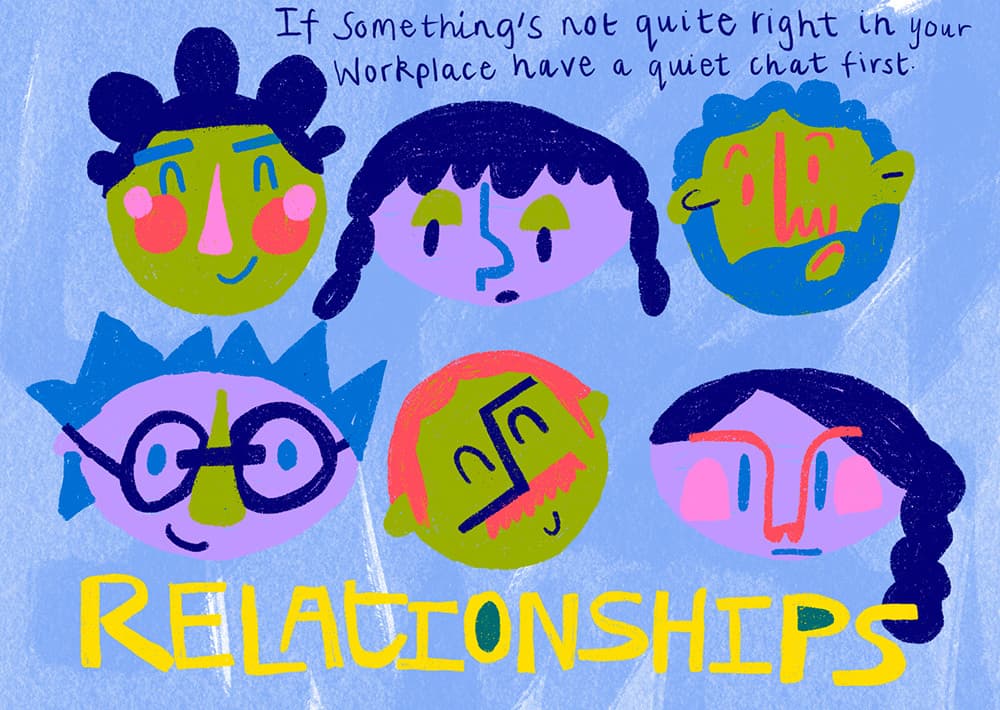If Something's Not Quite Right in Your Workplace, Have a Quiet Chat First
Workplace conflict is an unavoidable fact of life. How managers tackle it can have profound consequences for people and organisations.

If you would like a printed version of the entire series when its published, then please contact us on hello@workwiseforscreen.org.uk
From Conflict to Creativity...
How Early Resolution Can Build a Stronger, More Productive Team
Workplace conflict is a significant issue in the UK creative sector. A recent landmark report from the Creative Industries Independent Standards Authority (CIISA) revealed that:
Conflict costs the industry approximately £1.8 billion annually in lost productivity and growth.
Of this figure, the highest cost is attributed to people leaving employment or ending a contract early due to conflict.
Nearly a third of the UK's 2.4 million creative workers have experienced conflict. Of those who experienced conflict, 60% are employees and 40% are self-employed.
The overall cost of conflict is estimated to be 1.3% of the sector’s output.
Looking beyond the economic burden, the human costs of conflict can be long-lasting and even life changing. Anxiety, depression, and burnout take a toll not only on those directly involved, but also on colleagues working in high-conflict environments.
The screen sector can be particularly prone to conflict due to the pressures of the production environment.
In an industry where employment protections are not always guaranteed, it is therefore vital that leaders learn to understand and harness conflict in a way that minimises harm and creates a psychologically safe environment in which teams can thrive.
Defining workplace conflict
A good starting point is to distinguish task-based from relationship-based conflict. Task conflict is disagreement about the way that work gets done. Relationship conflict is about personal clashes. Successful management of task conflict can nurture innovation and joint problem-solving. Relationship conflict can be genuinely destructive if not handled appropriately. If not resolved early, it can lead to formal processes such as grievance, as well as increased absenteeism and early departures.
Psychological safety matters
While it is helpful to better define conflict, neither people nor conversations fit neatly into boxes. People are personally invested in their work, and work relationships can influence individuals’ sense of self. Relationships built on trust, not just process, are therefore a key tool in preventing the escalation of conflict.
This is why it is vital for managers l to create a psychologically safe environment where all conflict – task, relational or something in between – can be resolved early and informally.
Early resolution: tips for effective conflict management
Spot the early warning signals. If you see evidence of tension or communication breakdown, speak informally and impartially with those concerned – “I’ve noticed some tension recently; shall we have a check-in?”
Set some ground rules for at the start of a project, for example on how feedback is shared or how to raise concerns. This is particularly important where teams may be working together on a one-off basis.
Recognise the power dynamics at play. Those freelancing may feel less able to voice their issues. A junior runner will most likely struggle to voice concerns about a producer. Create a safe space, and get support in doing so, from HR or other management colleagues.
Learn lessons and debrief. It can be tempting to move on swiftly from conflict, but by briefly documenting the outcomes and agreed next steps, lessons can inform future projects and conflict scenarios, as well as your management practice.
This article is written by Lucy O’Melia, Head of Learning and Development Services, Involvement and Participation Association
The Institute for Employment Studies (IES) is an independent, apolitical, international centre of research and consultancy in public employment policy and HR management. It works closely with employers in all sectors, government departments, agencies, professional bodies and associations. IES is a focus of knowledge and practical experience in employment and training policy, the operation of labour markets, and HR planning and development. IES is a not-for-profit organisation.
Sources:
CIISA – Unlocking Growth Through Accountability
Guenter H, van Emmerik H, Schreurs B, Kuypers T, van Iterson A, Notelaers G. When Task Conflict Becomes Personal: The Impact of Perceived Team Performance. Small Group Res. 2016 Oct;47(5):569-604.